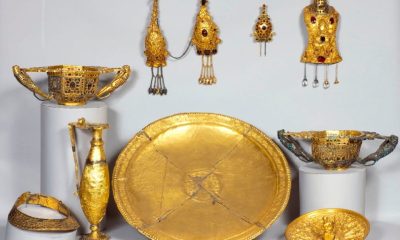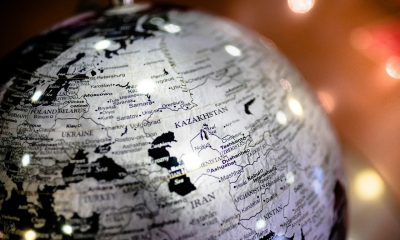Azerbaijan
Iran and Russia are united in their denial of Azerbaijani and Ukrainian identities

In August 2022, Iran joined the Russian-Belarusian coalition fighting the genocidal war against Ukraine. By December of that year, Iran had supplied more than 1,700 drones that are capable of suicide attacks, surveillance and intelligence. This year Russia and Iran developed a plan to build a plant in the Russian Federation to build 6,000 Iranian drones each year, writes Taras Kuzio.
Most Western analysts have focused on a common anti-American and anti-Western front as the main reason why Iran joined the Russian-Belarusian coalition. All three countries are hostile to what they describe as the US-led unipolar world which they seek to replace with a ‘multipolar world.’
While there is no doubt Iran’s theocratic regime has always been virulently anti-American and anti-Western this does not explain why the most powerful potential member of such a coalition – China – has maintained a guarded neutrality and has not supplied military equipment to Russia. Indeed, at the UN, China has mainly abstained, rather than supported Russia on votes condemning the invasion of Ukraine. In May, China voted in favour of a UN resolution that included a condemnation of ‘aggression by the Russian Federation against Ukraine.’
After discussions with the US, China also advised the Kremlin to back away from its virulent threats to use nuclear weapons against Ukraine. Although these threats continue to be aired on Russian state TV, Russian President Vladimir Putin has scaled back his nuclear war mongering.
In reality, the main reason Iran is allied to Russia is because it has a similar chauvinistic attitude towards its neighbours as does Russia. Iran denies the existence of an Azerbaijan people in the same way Russia denies the existence of a Ukrainian nation. Persian nationalists who rule Iran view Azerbaijan as an illegitimate country in the same manner as Russian nationalists like Putin view Ukraine as a fake country.
Persian and Russian nationalists view Azerbaijan and Ukraine respectively as belonging to their spheres of influence because of historical, cultural, and religious factors. Azerbaijan and Ukraine were allegedly always part of the Persian and Russian empires respectively and have been torn away from their ‘motherlands’ by anti-Iranian and Russophobic countries.
Iran views Azerbaijan as part of its Shite sphere of influence, a country which it has an innate right to expand its extremist definition of this wing of Islam into. As an arm of the Russian state, the Russian Orthodox Church promotes a fundamentalist understanding of orthodox Christianity that has supported the war against Ukraine. Orthodox Ecumenical Patriarch Bartholomew condemned: "The church and the state leadership in Russia’ as having ‘cooperated in the crime of aggression and shared the responsibility for the resulting crimes, like the shocking abduction of the Ukrainian children."
Both Iran and Russia have trained and financed agents, media, political and religious extremists in Azerbaijan and Ukraine respectively. In May, Azerbaijan detained 47 Iranian agents seeking to overthrow the government through assassinations of Azerbaijani leaders. Pro-Iranian cleric Haji Ali Beheshti and four Iranian diplomats were expelled from Azerbaijan. In March and May, Iran was behind an assassination attempt on Fazil Mustafa, a parliamentary deputy who had been very critical of Iran, and a terrorist attack on the Azerbaijani embassy in Tehran. Following raids on Russian Orthodox Church properties, Ukraine has detained and imprisoned tens of Russian Orthodox priests for propagating support for Russia’s invasion and collaborating with the invading Russian army.
Iran and Russia deny independent agency and sovereignty to Azerbaijan and Ukraine respectively to choose their foreign allies. Iran is incensed Azerbaijan has a strategic partnership with Turkey which it views as the expansion of pan-Turkism into its Persian sphere of influence.
Iran is also incensed at the long-standing Azerbaijani strategic alliance with Israel, another country whose existence Iran refuses to recognise. Iran and Russia are the only countries in the world who seek to annihilate other countries. Iranian and Russian leaders have openly declared their genocidal intentions against Israel and Azerbaijan respectively.
Persian and Russian nationalists deny the right of Azerbaijan and Ukraine to forge alliances outside their spheres of influence. Russia views Ukraine as a Little Russian branch of a mythical nineteenth century pan-Russian people alongside great Russians and white Russians (Belarusians). Russia does not view Ukraine as having agency or sovereignty and proclaims its war in Ukraine is a fight against the West. Tehran accuses Azerbaijan of becoming a ‘Zionist’ staging post that threatens its national security. Ahead of its invasion, the Kremlin claimed the West had transformed Ukraine into an ‘Anti-Russia.’
Since the 2020 Second Karabakh War, Iran has held three military exercises on its border with Azerbaijan, supplied drones and other types of military equipment to Armenia, and trained illegal Armenian forces in Karabakh. Russia held several military exercises on its border with Ukraine prior to invading in February of last year.
The roots of Iran joining the Russian-Belarusian military alliance are deeper than merely anti-Americanism and anti-Westernism resting and old-fashioned imperialism and chauvinism towards Azerbaijan and Ukraine. With Putin’s Kremlin reviving nineteenth century chauvinistic myths about Ukraine, Iran and Russia are natural allies in their twenty first century genocidal war drawing on centuries’ old grievances.
Taras Kuzio is a professor of political science at the National University of Kyiv Mohyla Academy. His latest book is Genocide and Fascism. Russia’s War Against Ukrainians.
Share this article:
-

 Tobacco3 days ago
Tobacco3 days agoThe switch from cigarettes: how the battle to go smoke-free is being won
-

 Azerbaijan4 days ago
Azerbaijan4 days agoAzerbaijan: A Key Player in Europe's Energy Security
-

 Kazakhstan4 days ago
Kazakhstan4 days agoKazakhstan, China Set to Strengthen Allied Relations
-

 China-EU4 days ago
China-EU4 days agoMyths about China and its technology suppliers. The EU report you should read.






















